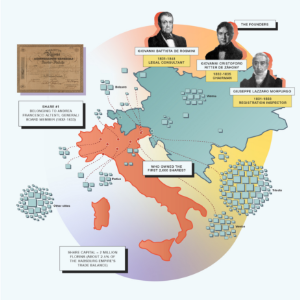The story of Andrea Francesco Altesti

“This is the story of a multifaceted, charismatic, and elusive man.
A mysterious and fascinating figure, citizen of the world before the ends of the world were those of today. A man who held prestigious positions and secret positions, who spoke as equals with emperors and heads of state and perhaps also for this reason was exiled to desolate places, before being rehabilitated and disappearing into thin air, without a trace.”
These are the director’s notes of a play that wanted to tell the story of the first Generali shareholder in history: Andrea Francesco Altesti.
Jealously preserved in the headquarters of the Generali Historical Archives in Trieste, the share issued on the 30th of June 1832 sanctioned the beginning of the widespread shareholding of the company, an innovative change of pace for Trieste and its soundest companies and consequently, as has always happened, for the whole “Trieste System”.
The share is a piece of paper of the size of an A4 sheet bearing the words: “Share certificate of Assicurazioni Generali Austro-Italiche of a thousand florins (...) which is sold to Mr A.F. Cavalier d’Altesti.”
At the time, Altesti is a 66-year-old man, a board member of the company, born into a family of ‘citizens’, a middle class between plebs and patricians, in Ragusa of Dalmatia, the Croatian Dubrovnik, trader, diplomat, politician, secret service man.
For this reason, when the curtain opens, the audience in the hall will see on the right a flag depicting the double-headed eagle, coat of arms of the Habsburg Empire and Generali, an ancient desk to symbolise the protagonist’s diplomatic activity, a travel trunk to indicate his nature as a traveller, and the first Generali share in his name projected on the backdrop.
A few seconds after the curtain opens, a man appears on stage and reaches the centre of the scene. He is illuminated from the neck down. The white moustache on his face and his silver hair can be glimpsed. He lights a cigar with a lighter and starts talking:
When I countersigned that share (he points to the projection behind him) I was at the peak of my career. Board member of an important and renowned company that had just opened its doors to the fair participation of shareholders, a totally new legal formula for the time: the joint stock company.
It was a great adventure and I was happy that the first stone had my name written on it. A stone that would build a cathedral.
I had the honour of working together with high-profile companions such as Giuseppe Lazzaro Morpurgo, long-term insurer, Giambattista de Rosmini, the highest-rated lawyer in Trieste, and Marco Parente, a financier of great charisma, people with diverse skills, walks of life and religious backgrounds: Venetian Catholics, Triestine Jews, German Lutherans.
Then my life took other, remote ways.
I have always travelled a lot, ever since my father and I moved from Dalmatia to Constantinople, where I met the Russian ambassador, and thanks to him I moved to St. Petersburg where I had the honour of forming very close ties with Catherine II, who you may remember as Catherine the Great. Pity that at her death her successor didn’t appreciate my commitment as Private Secretary of State and Cabinet Secretary and forced me into exile in Ukraine, accusing me of stealing state documents.
I could tell you all about those years in detail, but that’s not why we’re here.
Fortunately, Tsar Alexander I understood my reasons, and I was able to leave that place of frost and darkness to return to travel, especially to France by virtue of my old friendship with Giuseppe La Brosse, of Napoleon Bonaparte’s secret service.
But we’re not talking about that either tonight.
What I want to tell you is how, after leaving France and settling in San Giorgio di Nogaro, my life took me elsewhere for the umpteenth time, until I was forced to disappear altogether, without a trace.
Welcome.
The play was never performed because the actor who was supposed to play the part of Andrea Francesco Altesti disappeared under mysterious circumstances.
That first share in the name of Altesti was transferred in favour of Pasquale Revoltella and still bears the double name today.
HISTORY
Since its beginnings, Generali has shown a particular sensitivity to “participation” as a decision-making and organisational mechanism. From a financial point of view, this is reflected in its initial capital base: Generali’s first 2,000 shares were equally participating. Given the happy economic and historical situation, for Giuseppe Lazzaro Morpurgo it was time for a qualitative leap: the establishment of a company with extensive corporate bases.
The shares, for their nominal value of 1,000 florins each (corresponding to approximately 22,000 current-day euros) represented a considerable investment at the time. The founders’ shares were identified with numbers from 1 to 1,000 and had to be signed by all the directors of the company in accordance with the bylaws. They also established that the privileges granted to the founding shareholders by company statute were attached to the shares and therefore transferable to any subsequent purchaser. Share number one (kept in the Generali Historical Archives) was registered to Andrea Francesco Altesti, a Generali board member in 1832-1833 and a skilled merchant, for many years at the service of the Russian diplomacy at the time of Catherine the Great and Alexander I. On the back of the share, the transfer is registered to Pasquale Revoltella.
In 1870, Generali was confirmed as the first company in Italy and the number of Italian investors also increased: four-fifths of the capital was in Italian hands.
